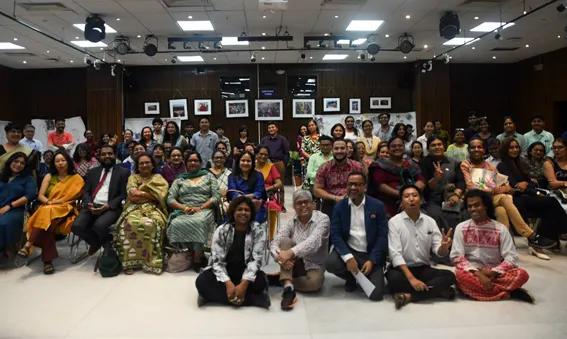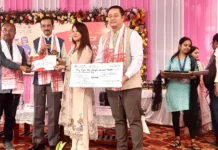KOLKATA, 30 Apr: The final advocacy conclave titled ‘Voices of diversity: Action for inclusion’ was held at the American Centre here in West Bengal on 24 April, marking the conclusion of a project titled ‘Rainbow dialogues: All in this together’, implemented by US-based non-profit Story Centre, in collaboration with BRIDGE, India, and with support from the US consulate general here.
Over a period of 20 months, individuals from diverse backgrounds came together
to discuss the rights, lives, and challenges faced by the LGBTQI+ community across the seven Northeastern and eastern Indian states, including Arunachal Pradesh, Assam, Jharkhand, Manipur, Nagaland, Odhisa, and West Bengal.
The participants engaged in interactive discussions on issues in education, healthcare, workplaces, and other sectors during the final conclave. The event also featured screenings of short storytelling films developed during ‘rainbow storytelling’ workshops, aimed at stimulating further public discourse.
At the heart of the conclave was the focus on integrating the LGBTQI+ community members into the larger society and enabling them to live fulfilling lives of dignity, access, and equal rights. The project aimed to achieve this through a multi-layered approach, including a survey of LGBTQ+ individuals, employers, educators, and service providers to gauge perceptions and find workable solutions towards inclusion.
Amy L Hill, director of Silence Speaks at Story Centre, USA and lead for the project, expressed pride in being part of the work to bring visibility and awareness to the LGBTQIA+ issues in east and Northeast India.
American Centre, Kolkata Director Elizabeth Lee spoke on the significance of human rights, and acknowledged the intertwined struggle of the LGBTQI+ individuals for rights and recognition with the broader fight for human rights.
During the 20-month period, representatives from West Bengal, Arunachal, Assam, Nagaland, Manipur, Odisha, and Jharkhand engaged in constructive dialogues, brainstorming sessions, and advocacy efforts. The conclave, intentionally designed to reflect India’s diversity, proposed actionable strategies for enhancing the inclusion of the LGBTQI+ community in the formal economy and beyond.
Doctoral fellow (psychology) and ICMR project research scientist from Arunachal, Yuma Narah, one of the panellists at the conclave, shed light on the socio-cultural context of the state.
Narah highlighted various challenges, including societal alienation, based on appearance, insufficient healthcare infrastructure, lack of educational institutions offering psychology programmes, and inadequate remuneration for mental health professionals.
Narah stressed “the urgent need for increased awareness among mental health practitioners regarding LGBTQIAP+ specific stressors to promote mental wellbeing for all.” Narah also advocated “Arunachal Pradesh’ inclusion in the AP QueerStation, marking a significant milestone in the history of sexual and gender minorities in the state.”
BRIDGE director and country coordinator for the project, Prithviraj Nath, described the initiative as “an attempt to create evidence, initiate, and strengthen conversations around inclusion and equal rights for LGBTQ+ individuals.”
Nath highlighted the project’s success in creating networks, forging new paths, and garnering commitments from institutions across the seven project states to take tangible action towards inclusion and equal rights.
Sawang Wangchha from AP QueerStation, one of the project coordinators, expressed gratitude to BRIDGE, Story Centre, and the US consulate general in Kolkata for involving queer individuals and professionals from Arunachal in the event.
Wangchha noted that the event empowered queer individuals from Arunachal to openly share their stories, “instilling confidence and hope for more diverse events in the future aimed at uplifting LGBTQIA+ individuals.”
“With the visibility of Arunachal’s queer community on the rise, I anticipate greater inclusion from organisations to support their rights and dignity, and to combat societal taboos,” Wangchha said.


